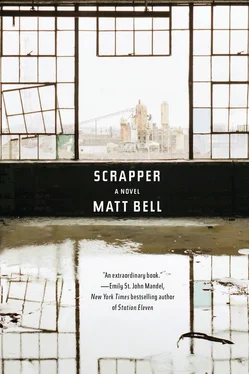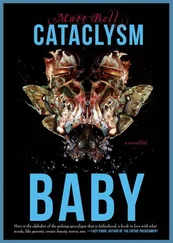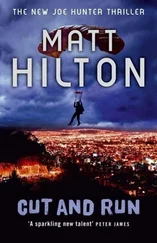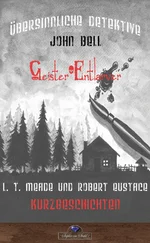What did this mean for him, for the good man he had tried and failed to be?
In some houses he found handwritten notes. He found one taped to the cracked plaster across from the house’s front door: we’re leaving in the morning. And then the date the last inhabitants left, not so long ago. In the back of a child’s closet he found a scrawl of crayon reading i’ll be back for you, written to the house, to whatever the child thought a house was. Sometimes there was an animal living there still. The animal was always a cat. What did these cats eat? Where did they sleep and piss and shit? Sometimes it wasn’t hard to see. The skeletons of mice. Shit in one corner of a room, the smell of piss everywhere.
The cat following Kelly from room to room, rubbing its body against his boots.
Names everywhere. On the houses. In the asphalt. Carved into trees, fences, doors.
i love you house, one note read.
i built this house with my hands, said another.
goodbye.
i’m sorry.
we had to leave but this was home.
KELLY SCRIBBLED HIS FIRST NAME on a name tag, adhered it to his shirt pocket, took a seat on the unoccupied side of the circle of chairs. The group’s facilitator crossed the church basement, offered her hand. She was all trunk, her middle dwarfing her limbs, had a small mole sprouted from the sensitive skin beneath her lip, a tiny flaw in a good face. She called Kelly by his name, asked if he wanted to share.
No, he said. He wanted to listen.
She nodded, patted his hand, released him. When the sharing began the others repeated the past, made it present again. The simultaneity of error and accident, of grief and loss. A red-haired woman had lost her husband in a car crash. A beautiful teenager lost her best friend in a drive-by shooting. The automobile had made the city great but look how much it took in return. The night stretched long. A house fire, a drowning, all the cancers and their medieval treatments. Whenever there were suicides no one ever mentioned the methods. There was a parade of misery described but much of it sounded familiar, stories whose ends could be known by their beginnings. Kelly’s face twisted and he didn’t know how to make it stop. How long had the others been coming. How many times had they come together to share their stories, in these words. There was change pushing forth from their faces but he could see how deep the past had carved them. He didn’t know how to escape the constraints of the past either but maybe he’d come to the group to find out.
If Kelly had shared he would have said that he was afraid, that what he wanted was a way to end his fear.
For a long time, he might have said, he had at least succeeded in feeling it less.
Love meant letting his vigilance down but his vigilance had served him better. He had slipped only once.
As the others talked Kelly remembered the hardness of his father. How big the man’s face had been, all jowls and grinding jaws, the father chewing side to side like a ruminant. Those square teeth against pot roast, carrots, root vegetables. Biscuits from a can. The way the man’s joints popped when he walked, how he cracked his knuckles at the table and during the news and after, his father’s limbering of his body for food, information, fucking. The way he shook his shoulders loose when he stood from the table, when he exited the bedroom pale and spindle legged and splendid in his underwear. His father the wrestling coach, Kelly his best student, a state champion like his father before him. In those boyish days Kelly had loved the father with an intensity never again felt, loved the way the man strode the earth grimed with work, his bones shining through his skin as he sat silent before the glowing television, his voice rarely eloquent except in the darkest hour of night, when sometimes he came into Kelly’s room, as some stranger Kelly would have to pretend was not still there when they awoke.
Wrestling in high school had led to wrestling in college but he hadn’t lasted. With others it was a knee or a shoulder but his injury had been some failure of will, an inability to show up. A deep lethargy had come over him once out of his father’s home, out from under his father’s coaching. He’d started sleeping long and late, ten or twelve hours a night. In classes he’d dozed and dreamed and at practice he’d refused to work his hardest, turning in the slowest laps, the laziest reps and calisthenics, shying away from the contact of position drills, mock rounds.
Takedown, reversal, escape, takedown, breakdown, fall: a basic plot that could be complicated by a clever strategy, some technical achievement. He stopped shooting on the legs, stopped working toward the pin. A flinching from the fight. Three rounds passed, three minutes then two minutes then two more. During matches he got cited for stalling, a refusal to engage. If he started on top the other boy would explode unchecked to his feet. Kelly tried to keep his distance but it was after he was taken down his real talents emerged. There were only a few ways to escape: the stand-up, the switch, the sit-out, the roll. He didn’t engage but he didn’t give up either. He could be taken down and turned on his back but he was hard to pin, grew more stubborn the closer he got to defeat. Maybe he wouldn’t try to win but he couldn’t stomach losing.
Weigh-in days you could check your weight in the morning with a banana in your hand and if you were underweight you could eat the banana. In the mirror there were always the folds of your former self, the hanging skin around the waist, self as shame refusing to fall away. You ate or didn’t eat the banana. You ran the miles. You carried the carcass of before. You climbed the scale naked and nervous and old as you had ever been and you were so young and you wondered if today was the day you measured light enough for battle.
He remembered the bodies of the other boys, lean and carved, organized by weight class. Veins cording forearms and calves, throbbing out of a neck the size of a thigh. Fingers cracked and broken and taped, eyes screwed and bulged out of a drawn face, all bones and bravery. He could go days without food, without any more liquid than it took to rinse his mouth. All your own meat could be made of was food and if you didn’t eat any food there’d be less meat.
Every morning he lifted and ran and every afternoon he threw his body at the body of another boy, practiced takedowns and reversals and arm bars, the half nelson, the quarter nelson. There were illegal moves no one ever taught but the team learned them anyway, taught each other, passed them down. Armlocks, leglocks, spinal locks. Small-joint manipulation. Choke holds, other methods for smothering. Slamming or spiking. No punching, no kicking, no gouging of the eyes. No fishhooking the mouth or nose. No squeezing the genitals. These were the ways to hurt a man, to bend his will faster than the rules would allow. You couldn’t use them in a match but after you had the knowledge weren’t you waiting for your chance.
His coach yelled but Kelly’s failure wasn’t a matter of motivation. Kelly skipped a practice, failed a weigh-in, missed the bus for a meet. There were better weeks where he found his enthusiasm and the coach said he thought maybe Kelly was shaking off a freshman slump but before the season ended Kelly packed his dorm room and left campus. There wasn’t anyone to tell he was leaving. He appreciated the coach giving him a chance but he didn’t owe the man a call. They weren’t close, not like the coach was close to the other guys.
He hadn’t made the kind of friends he wanted to make. He knew he wasn’t stupid but the classes had bored him too. Their steady drip of fact, fact, fact. He didn’t call his parents but before he left his father called him, said the coach had called first.
Читать дальше












